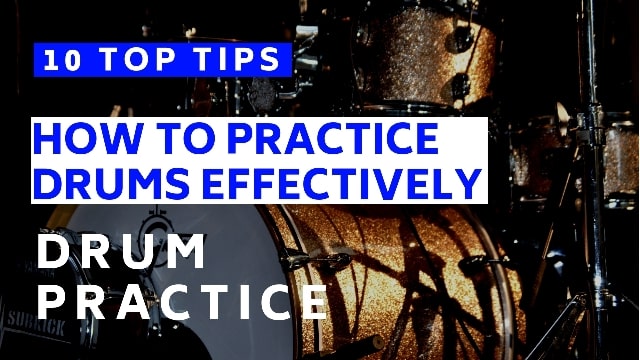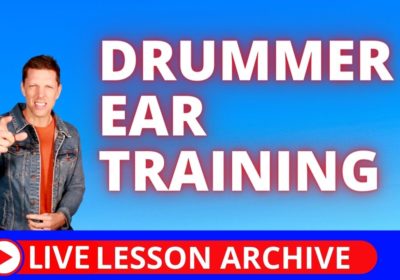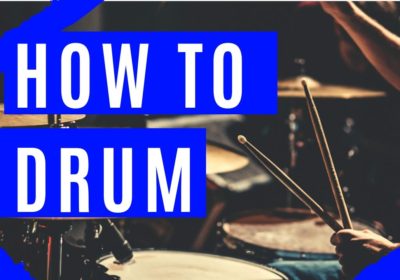How to Practice Drums Effectively
Optimise your drumming and get better quicker

Learn how to practice drums effectively
This article offers ten tops tips to help you learn how to practice drums effectively. Many drummers put decent hours in every week but feel frustrated because they aren’t getting the results they want. This frustration makes us feel demoralised and eventually we stop practising altogether.
That’s why it’s so important to learn how to practice drums effectively and get better on the drums quickly. That keeps us motivated and pushing forward, which in turn feeds the satisfaction so a nice productive cycle supports itself as we make gains every week.
1. Organise Practice Time
It’s so easy to get overwhelmed. We need to working on timing, rudiments, learning songs for a show, independence, that weak left hand, bass drum speed, Latin grooves, arrrggghh! It’s impossible to do it all. And as soon as the brain starts to feel overwhelmed it shuts down or makes us abort the mission. We can end up doing no practice because we’re so stressed that there’s too much to learn. That’s no good at all.
Break it down and carefully plan what you will practice each week, and even which day. Then your poor brain can relax safe in the knowledge that you have achievable and focused goals for that practice session. This will lead to much more frequent, motivated and effective practice just by organising what you will learn each day.
You can download a FREE practice planner to help you plan your sessions.
2. Find Your Productive Phase
Many of us are terrible morning people. Others are useless after 8pm. We all have different parts of the day that we naturally find our brain is in it’s optimum state for learning and being creative. Once you identify your most productive phase in the day then you know you will get the most benefit from practising the drums then. This may cause problems if you are best at 1am because that doesn’t go down well with the neighbours. But if you can make it work using a pad, electronic drums or whatever works for you then see if you can schedule practice for this optimum point in the day. Watch your progress sky rocket!
3. Map Out Practice Priorities
Write down your practice priorities. It might be a technical thing, it might include correct posture, it might be certain drumming vocabulary or exercises. Whatever it is that you know you need to focus on write it down. I like to write it on paper and have it somewhere that I can’t miss it. You might prefer to have it in your Google calendar. As always, find a method that suits you best. When it comes to practice time you need to make sure these priorities are the main focus. Work on your weaknesses most.
4. Get in the Zone
You need to switch your brain off from the fast paced, crazy world and tune it in to this drum practice session if you want to practice drums effectively. The best way to make this transition successfully is a warm up. It’s so tempting to bypass this part but it’s crucial both physically and mentally.
The warm up allows your muscles to be ready for the physical effort of the practice session. You wouldn’t go right into a 100 metre sprint without warming up would you. You know that would be ineffective and also risk injury. Apply that same mindset to the physical act of drumming. Seriously, your body will thank you down the line. Whilst we’re doing the warm up we get a chance to really check our posture and technique. These are aspects that can easily fall to the side when we are super focused on new content and techniques.
The warm up also allows you to mentally switch from the outside world and get focused on the drum practice session.
5. Slow Down!
Yeah I know that’s boring but this is the number one reason that I see so many drummers put time into their drumming without getting results. They practice too fast and either play the part wrong or play with terrible technique, timing and feel. Play it slow, teach your body and mind the correct material and technique for whatever you are trying to achieve. Learning it with slow, conscious and accurate playing and you will reach the goal faster and with much better accuracy.
6. Good Habits
Get in good habits and correct every mistake. Don’t disregard it or have a ‘that will do’ attitude. Every time you play something poorly you are teaching your brain the habit of doing things that way. If you constantly use poor posture, sloppy timing or practice things to fast so they are inaccurate your brain is being trained to play that way next time. You are effectively training yourself to be bad. Sometimes you will find that you are doing more harm than good so you might as well not bother practising at all.
DO NOT PRACTICE YOUR MISTAKES! Seriously, just don’t. Take your time, play with purpose and be conscious about everything you do. Make it count and you will achieve more good in 15 minutes of quality practice than an hour of bad practice.
7. Tik Tok
It is crucial for a drummer to be able to play with a metronome but there is also a risk. If we always play with the metronome we can lose confidence in our own ability to play in time. I’ve seen it happen to others and I’ve felt it happen to me. In fact I realised a problem and took action to improve my internal metronome as soon as I recognised the problem. I was doing so much practising, recording and live performance with a click that I lost confidence in my ability to keep time without a click.
So definitely work hard with your metronome but also work hard on your own ability to stay in time. You can take this free timing course that focuses on both sides of timing if you are interested. It’s relevant to all abilities so jump in for free and work on that timing!
8. Record and Analyse
Recording yourself is a brutal exercise but it’s so valuable. When you listen back to your playing your brain is free from performing so you can fully focus on what you hear. That perfect timing you thought you had might actually be quite messy. That amazing fill you did might suddenly sound way over the top and unnecessary in the song. Listening back to yourself gives you the perspective of the audience and it will help you learn so much more quickly than if someone else tells you something is wrong. This will inform how you play in the future which leads to a much more mature, experienced approach to drumming.
Don’t worry if you don’t have a full blown recording studio. Just record using your phone. It might not sound as good but you can still hear your strengths and weaknesses and benefit from the exercise.
9. Get Focused
Make the most of your practice time by being super focused. Turn off the smart phone notifications, shut down the emails. This time is for you and the drums. But even beyond those exterior distractions you need to work on focusing your mind. It’s so easy to go into autopilot and start daydreaming about what you did last night or what you’ll have for dinner.
Slow everything down to remove the muscle memory autopilot and get focused on all aspects of your playing. Not only will this improve your practice time but it is also the same mental approach you will need for live performance situations so you are simultaneously practising for gigs too.
You might be interested to read the time management article to make sure you are being productive with your time.
10. Have Fun!
Why do you even play drums? Because it’s fun. All of the regimented, focused, serious stuff that we discussed earlier is crucial if you want to become a great drummer but it’s got to stay fun or you just won’t be motivated to drum anymore. Never lose sight of the reason you started drumming.
So to that end schedule in a fun, freestyle section of your practice at the end. Use it as a reward. Here you can play anything. Improvise, jam with your favourite songs, rock out. Just let go and enjoy yourself. Not only does it give you that creative energy but it also allows things that you have learnt previously to show up on your free playing. This is necessary to complete the learning process. Allow your ideas to flow and have some fun!
Hopefully these tips will help you make the most of your practice time which in turn will help you become the best drummer you can be.
FREE timing course
By clicking below you can gain access to a FREE ‘Drummer Timing 101’ drum course that will give you the knowledge, tools and exercises that you need to quickly get your timing up to the level it needs to be.
It will provide:
- The two main types of timing to master
- MP3 backing tracks to practice with and develop great timing
- Full sheet music for all exercises
- Video demonstrations of every exercise
And more than that you will also get a ton of other great free drum resources to make you a better drummer such as playalong tracks, articles, exclusive video lessons and more. And it’s all free!
Watch the video to get a feel for what the drummer timing 101 course entails and then scroll down to get the course immediately.
Start today and develop perfect timing
So let’s start the course today. Do it now and begin your drummer timing 101 course and start developing perfect timing. It won’t happen instantly but if you follow the lessons in the course you will start to feel the change very quickly.
If at any time you’re not digging the content, simply unsubscribe. There’s nothing to lose and your details won’t be shared with anyone, nor will you be bombarded with sales type emails. Just great free drum content that I hope provides real value for you.



